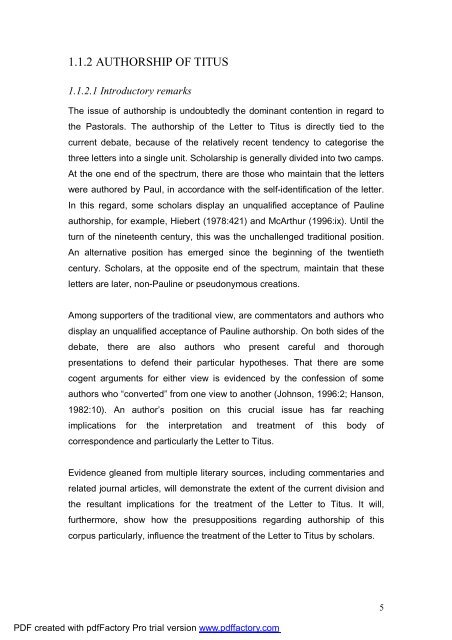A Text centred rhetorical analysis of Paul's Letter to Titus
A Text centred rhetorical analysis of Paul's Letter to Titus
A Text centred rhetorical analysis of Paul's Letter to Titus
You also want an ePaper? Increase the reach of your titles
YUMPU automatically turns print PDFs into web optimized ePapers that Google loves.
1.1.2 AUTHORSHIP OF TITUS<br />
1.1.2.1 Introduc<strong>to</strong>ry remarks<br />
The issue <strong>of</strong> authorship is undoubtedly the dominant contention in regard <strong>to</strong><br />
the Pas<strong>to</strong>rals. The authorship <strong>of</strong> the <strong>Letter</strong> <strong>to</strong> <strong>Titus</strong> is directly tied <strong>to</strong> the<br />
current debate, because <strong>of</strong> the relatively recent tendency <strong>to</strong> categorise the<br />
three letters in<strong>to</strong> a single unit. Scholarship is generally divided in<strong>to</strong> two camps.<br />
At the one end <strong>of</strong> the spectrum, there are those who maintain that the letters<br />
were authored by Paul, in accordance with the self-identification <strong>of</strong> the letter.<br />
In this regard, some scholars display an unqualified acceptance <strong>of</strong> Pauline<br />
authorship, for example, Hiebert (1978:421) and McArthur (1996:ix). Until the<br />
turn <strong>of</strong> the nineteenth century, this was the unchallenged traditional position.<br />
An alternative position has emerged since the beginning <strong>of</strong> the twentieth<br />
century. Scholars, at the opposite end <strong>of</strong> the spectrum, maintain that these<br />
letters are later, non-Pauline or pseudonymous creations.<br />
Among supporters <strong>of</strong> the traditional view, are commenta<strong>to</strong>rs and authors who<br />
display an unqualified acceptance <strong>of</strong> Pauline authorship. On both sides <strong>of</strong> the<br />
debate, there are also authors who present careful and thorough<br />
presentations <strong>to</strong> defend their particular hypotheses. That there are some<br />
cogent arguments for either view is evidenced by the confession <strong>of</strong> some<br />
authors who “converted” from one view <strong>to</strong> another (Johnson, 1996:2; Hanson,<br />
1982:10). An author’s position on this crucial issue has far reaching<br />
implications for the interpretation and treatment <strong>of</strong> this body <strong>of</strong><br />
correspondence and particularly the <strong>Letter</strong> <strong>to</strong> <strong>Titus</strong>.<br />
Evidence gleaned from multiple literary sources, including commentaries and<br />
related journal articles, will demonstrate the extent <strong>of</strong> the current division and<br />
the resultant implications for the treatment <strong>of</strong> the <strong>Letter</strong> <strong>to</strong> <strong>Titus</strong>. It will,<br />
furthermore, show how the presuppositions regarding authorship <strong>of</strong> this<br />
corpus particularly, influence the treatment <strong>of</strong> the <strong>Letter</strong> <strong>to</strong> <strong>Titus</strong> by scholars.<br />
PDF created with pdfFac<strong>to</strong>ry Pro trial version www.pdffac<strong>to</strong>ry.com<br />
5

















